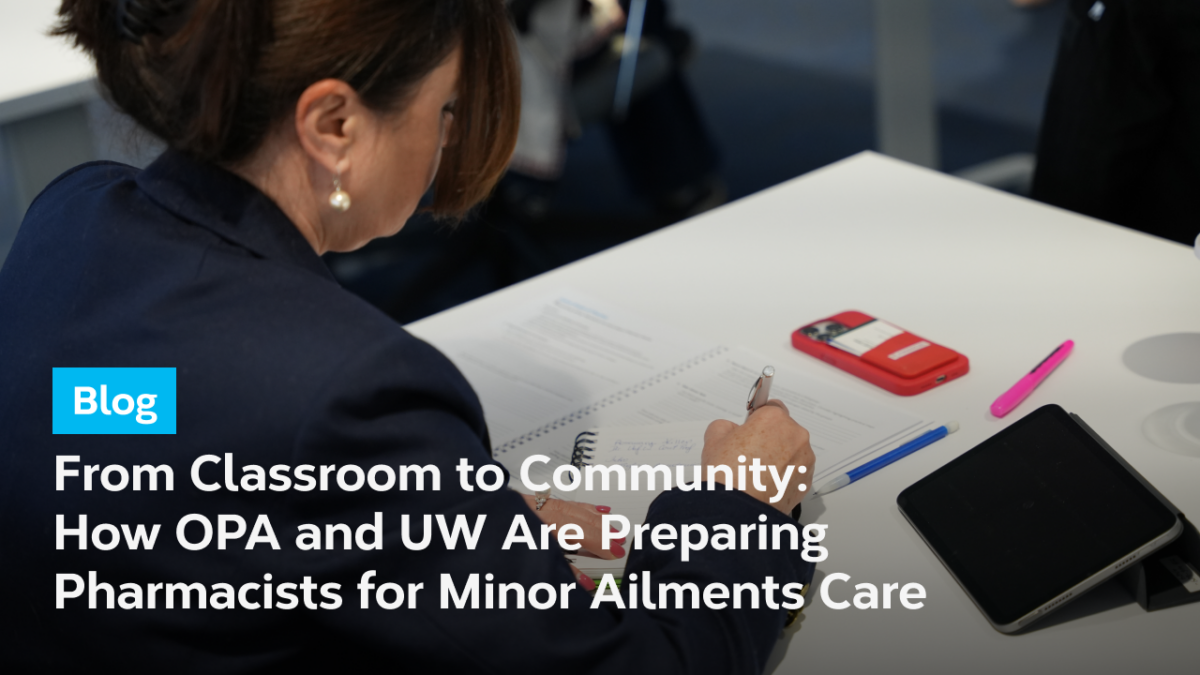Minor ailment assessments have quickly become a key element in Ontario pharmacists’ expanded scope of practice. Here’s how OPA and U Waterloo School of Pharmacy’s innovative joint program offers comprehensive, practice-focused education to support pharmacists in delivering timely, effective care for minor ailments.
There’s no denying that minor ailments prescribing has transformed the way pharmacists support patients in Ontario. As of September 2024, pharmacists have performed 1,279,988 minor ailment assessments in the province, for everything from acne to urinary tract infections (UTIs). Over 5,059 pharmacies are now participating in the program. To take full advantage of this new opportunity, many pharmacy professionals are seeking to upgrade their minor ailments knowledge with practice-readying education.
That’s why the Ontario Pharmacists Association (OPA), in collaboration with the University of Waterloo School of Pharmacy, has developed a program that goes beyond the basics. From in-depth clinical knowledge to workflow strategies and innovative tools, the program equips pharmacists with the confidence and skills to deliver effective care while streamlining pharmacy operations.
How It Started
The vision for the OPA-University of Waterloo minor ailments program grew out of a shared recognition: as pharmacists’ scope of practice expands, they need education that is both clinically rigorous and grounded in the realities of community pharmacy. Beginning in 2020, early conversations between OPA and U Waterloo leaders identified a gap: while pharmacists were eager to provide minor ailments care, they needed training that would build confidence, sharpen clinical decision-making, and support smooth implementation in busy pharmacies. From this need, the partnership was formed.
Since its launch, the program has been shaped by a commitment to excellence in professional development. The curriculum was designed not only to cover all 19 minor ailment conditions but also to equip pharmacists with practical strategies for patient care, workflow integration, and team collaboration.

Fig. 1 – A timeline of the program’s evolution. The content of the accredited online minor ailments course has now been licensed to other provinces as well as Ontario.
How It’s Going
Today, the OPA-University of Waterloo minor ailments program has evolved into a dynamic, ongoing model of exceptional continuing professional development. At its core is a modular, online accredited education program that covers all 19 minor ailment conditions in depth, ensuring pharmacists are equipped with the knowledge and clinical confidence to assess and prescribe. This is complemented by an interactive workshop series that allows participants to engage directly with facilitators, practise real-world scenarios, and exchange insights with peers. Together, these elements provide a comprehensive learning experience that balances academic rigor with practical application and mentoring.
Beyond the classroom, the initiative is extending its reach through conference participation, workshops, presentations, and ongoing research. Already in 2025, three workshops have been delivered, each receiving overwhelmingly positive feedback from pharmacists who valued both the peer-to-peer learning and the operational strategies they could immediately apply in practice. Additional research and presentation components, supported by faculty experts and OPA leaders, continue to expand the program’s impact by sharing findings, best practices, and new approaches to minor ailments prescribing. With this strong foundation, the program is setting the benchmark for pharmacy education in Ontario and beyond.
Learner Feedback
Feedback from pharmacists has been resoundingly positive, with participants emphasizing both the supportive learning environment and the practical tools they have implemented in their practices. Workshops were consistently described as a “safe space” for learning, with 100 per cent of participants highlighting how the format encouraged open discussion, questions, and confidence-building.
Learners also placed strong value on the program’s practical focus. Guidance on audit preparation was rated as the “most valuable” element by 94 per cent of participants, while strategies for optimizing pharmacy team involvement were described as “very helpful” in making minor ailments care more efficient and collaborative. Peer learning was another standout feature, with 92 per cent of pharmacists rating it as “valuable,” citing the engaging format, manageable group sizes, and abundance of practical tips as key strengths.
“Kudos to OPA and the University of Waterloo [for creating] this workshop, especially the opportunity for everyone to be together, [have] robust discussions, amazing conversations around ways to integrate minor ailments into the practice and really streamline the efficiency… I’m really, really happy that I signed up, and highly recommend for other pharmacists to take advantage of this program.”
— Margaret Brna, Pharmacist, Minor Ailments Workshop Attendee
Practice-Ready Education
Why such strong, positive feedback from attendees? It’s likely due to the program’s commitment to multi-faceted, practice-ready education. Built to the highest standards of professional development, the program ensures that pharmacists are not only equipped with knowledge but also with the hands-on skills and confidence to apply it immediately in their day-to-day practice. Each course and workshop is led by expert facilitators with extensive experience in minor ailments, bringing both academic excellence and practical, real-world insights into the learning experience.
The curriculum emphasizes timely, relevant knowledge supported by innovative tools and technology that enhance patient care, improve pharmacy workflows, and support operational excellence. From clinical decision-making to strategies for engaging the pharmacy team, the education is designed to prepare pharmacists for the realities of practice in Ontario’s evolving healthcare landscape. The result is a comprehensive program that empowers pharmacists to expand their role with confidence while delivering high-quality care to their communities.
Research Findings, Presentations and Publications
Ongoing research has been an integral part of the OPA-University of Waterloo minor ailments initiative, ensuring the program remains evidence-based and responsive to the needs of pharmacy professionals. During the minor ailment workshop pilot, structured educational research was conducted to better understand pharmacists’ and pharmacy technicians’ experiences with minor ailment service delivery. The primary objective of this research was to assess the level of confidence pharmacy professionals have across different aspects of delivering minor ailments care.
Secondary objectives were to explore how the use of decision support tools may enhance that confidence, as well as identifying the most common enablers and barriers encountered in practice. These insights not only strengthen the program’s ability to address real-world challenges but also contribute to broader knowledge within the profession.
The findings have been shared widely, with peer-reviewed abstracts accepted and presented at several conferences and major events, including:
- Canadian Association for University Continuing Education (CAUCE), May 28-30, 2025 in Niagara Falls/St. Catharines, Ontario
- Workshop: Innovations in Pharmacy Training and Practice to Advance Patient Care, May 29-30, 2025 in Washington, DC
- Canadian Pharmacy Education and Research Conference (CPERC/AFPC)
- Conference for the Association of Faculties of Pharmacy of Canada, June 17-20, 2025 in Niagara Falls, Ontario
- Lifelong Learning in Pharmacy Conference (LLLP), July 7-10, 2025 in Sydney, Australia
By embedding academic research into its foundation, the program continues to evolve, ensuring it reflects both best practices and the lived experiences of Ontario’s pharmacy professionals.
What’s Next?
The OPA-University of Waterloo minor ailments education program quickly established itself as a model of excellence in professional development, bringing together rigorous clinical training, practical tools, and a supportive learning environment that empowers pharmacists to confidently deliver care. With overwhelmingly positive learner feedback, strong uptake of the accredited modules and workshops, and impactful research that is already shaping conversations at national and international conferences, the program is making a significant impact in pharmacy practice and education as well as patient access to care.
As Ontario pharmacists’ scope of practice continues to evolve, this partnership is committed to evolving alongside it. Future iterations of the program will build on the foundation of practice-readying (or priming) education, incorporating new insights, technology, and research to ensure pharmacists remain equipped for the opportunities and challenges ahead. By investing in continuous learning and innovation, OPA and the University of Waterloo are not only supporting today’s pharmacy professionals but also shaping the future of minor ailments care in Ontario.
Want to learn more about the minor ailments program? Explore the full online program here, or discover the interactive, in-person workshop.


